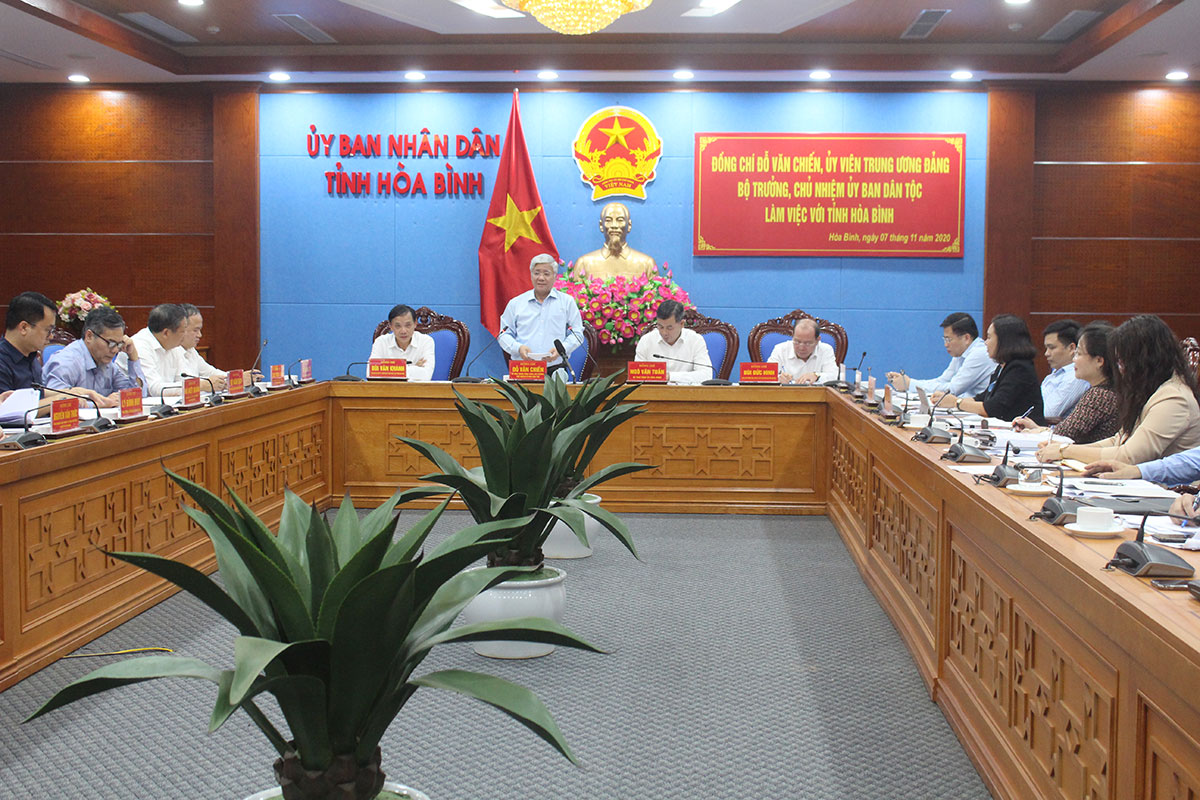
(HBO) – Do Van Chien, member of the Party Central Committee and Minister-Chairman of the Government Committee for Ethnic Affairs, had a working session in Hoa Binh on November 7 on the implementation of ethnic policies and preparations for the realisation of Resolution 120/2020/QH12 issued by the National Assembly in June 19, 2020 approving the policy of investing in a National Target Programme on socio-economic development in areas having ethnic minorities and mountainous regions in the 2021-2030 period (Resolution 120).
The delegation was received by Ngo Van Tuan,
Secretary of the Party Committee of Hoa Binh; Bui Duc Hinh, Deputy Secretary of
the Party Committee; Bui Van Khanh, Chairman of the provincial People’s
Committee; and Dinh Cong Su, Vice Chairman of the People’s Committee.
 Do Van Chien, member of the Party Central
Committee and Minister-Chairman of the Government Committee for Ethnic Affairs
at the working session.
Do Van Chien, member of the Party Central
Committee and Minister-Chairman of the Government Committee for Ethnic Affairs
at the working session.
As part of the efforts to implement Resolution
120, provincial departments and sectors have popilarised to the Party members
and locals on the purposes, meaning and significance of the document.
The provincial People’s Committee has directed
the revision and definition of ethnic minority and mountainous areas in
accordance to their development level in the 2021-2025 period, so that ethnic
policies will be applied in 151 administrative units at commune, ward and
township levels.
The province has proposed the Government
Committee for Ethnic Affairs to consider the selection of Da Bac district to
implement the item of "growing valuable herbal plants” of the programme.
Addressing the session, Ngo Van Tuan, Secretary
of the provincial Party Committee, said that the ethnic affair work has
received great attention from the province. The resolution issued at the 17th
Party Congress of the province also set particular ethnic-related targets,
including reducing the rate of communes with extreme difficult conditions to
under 30 percent in 2025. To this end, the province hopes for support from the
central agencies in investing in the infrastructure system, especially transport,
he said.
He expressed hope that assistance will be
provided to Da Bac district to implement the project of cultivating herbal
plants, and forest planting and maintenance. Alongside, it is necessary to
design investment policy for Kim Boi district as a special area of the province
to help local communes complete all criteria of the programme.
The proposals of the province were summarised by
the Minister-Chairman of the Government Committee for Ethnic Affairs who
pledged to create favourable conditions in investment capital for the province
to implement projects that match its real demands, aiming for sustainable
poverty reduction among ethnic minority groups.
For the proposals that belong to the authority
of the Government, the committee will submit them to the Prime Minister for
consideration and response./.
Hoa Binh province is undergoing a dynamic transformation amid Vietnam’s national digital transition. Building on Poliburo’s Resolution No. 57-NQ/TW on breakthroughs in science, technology, innovation, and national digital transformation, the province has rolled out a wide range of practical action plans. A standout initiative is the "Digital Literacy for All” movement, an effort to ensure that no one is left behind in the digital era.
Hoa Binh province is undergoing a dynamic transformation in the wake of the national digital transformation movement. Building on Resolution No. 57-NQ/TW of the Politburo on breakthroughs in science, technology, innovation, and national digital transformation, the province has implemented a wide range of practical action plans. A standout initiative is the "Digital Literacy for All” movement ambitious effort to ensure that no one is left behind in the digital age.
With a spirit of unity and proactive problem-solving, the Party Committee, the government and the people of Dong Lai Commune (Tan Lac District) have made great strides in implementing the resolutions of the 24th Party Congress of the commune for the 2020 - 2025 term. Focusing on leadership and practical actions, the commune has brought the Party’s resolutions into daily life, creating strong impacts and pushing the local development forward.
Amid the nationwide push for digital transformation, young people in Hoa Binh Province are stepping up as dynamic pioneers, applying technology to enhance Youth Union operations and expand the reach of youth-led initiatives. Through creativity and adaptability, Youth Union organizations at all levels have introduced a series of practical solutions, contributing to modern governance and community development.
In recent years, An Nghia commune, located in Lac Son district, has stepped up administrative reform, focusing on improving the quality and efficiency of its single-window service unit for receiving and processing administrative procedures. These improvements have helped create favourable conditions for local residents and organisations to handle administrative procedures, contributing to the commune’s broader socio-economic development.
The Prime Minister-approved master plan to develop the multi-use value of forests ecosystems through 2030, with a vision to 2050, aims to improve the management and sustainable use of forest resources, create jobs, increase incomes, and improve the living standards of ethnic minorities, people in mountainous and remote areas, forest workers and those living near forests.



 Do Van Chien, member of the Party Central
Committee and Minister-Chairman of the Government Committee for Ethnic Affairs
at the working session.
Do Van Chien, member of the Party Central
Committee and Minister-Chairman of the Government Committee for Ethnic Affairs
at the working session.